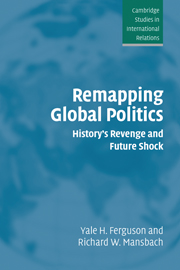Book contents
- Frontmatter
- Contents
- Preface
- Acknowledgments
- 1 Postinternational politics
- 2 Theory and method
- 3 Political space and time
- 4 States and other polities
- 5 Identities in a postinternational world
- 6 A postinternational world economy
- 7 War in a postinternational world
- 8 Technology and change
- 9 The future
- Index
- CAMBRIDGE STUDIES IN INTERNATIONAL RELATIONS
2 - Theory and method
Published online by Cambridge University Press: 22 September 2009
- Frontmatter
- Contents
- Preface
- Acknowledgments
- 1 Postinternational politics
- 2 Theory and method
- 3 Political space and time
- 4 States and other polities
- 5 Identities in a postinternational world
- 6 A postinternational world economy
- 7 War in a postinternational world
- 8 Technology and change
- 9 The future
- Index
- CAMBRIDGE STUDIES IN INTERNATIONAL RELATIONS
Summary
With what theoretical tools should we approach the postinternational enterprise? Theorists' visions of the world around them are filtered through and colored by their own preferences and perceived interests, expectations, normative commitments, and personal experiences and memories. Theory also entails strategic simplification, a process through which brute “facts” are refined. Facts themselves have no meaning until the theorist has organized them into patterns that themselves may not exist apart from the theorist's own imagination. The essential tasks for the theorist are to point out what it is necessary to explain and why, and what phenomena are likely to provide the desired explanation(s). Such recognition is intuitive, a product of our inner eye rather than of some external “reality.” In the end, then, it is the theorist who, by the constant interaction of induction and deduction, imposes logic on events, “sees” patterns in them, and “labels” them. The result is never more than a single and necessarily partial version of reality.
Theorizing, then, is an act of creation, imagination, and insight. “Eureka, I see what all this means! I see how the facts are related! I see the elements of cause and effect in the patterns that are emerging in my consciousness.” In a very real sense, such acts of creative imagining are what we associate with and expect from the dramatist, the novelist, the musician, or the painter, and it is that same recognition that leads us to condemn extreme “relativism.”
- Type
- Chapter
- Information
- Remapping Global PoliticsHistory's Revenge and Future Shock, pp. 35 - 66Publisher: Cambridge University PressPrint publication year: 2004

